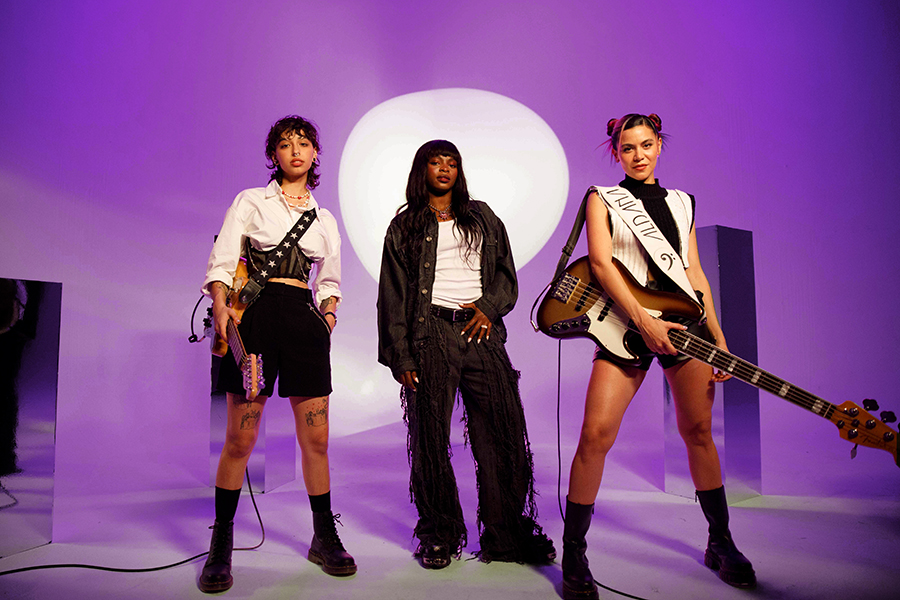INTERVIEW: Latin pop-funk trio DARUMAS breaking preconceptions

DARUMAS; L to R: Ceci Leon, Vedala Vilmond and Aldana Aguirre. Courtesy Lucía Olmos.
The musical backgrounds of the members of DARUMAS are as diverse as their roots and upbringing. The Latin-American funk and pop trio consists of Cuban American guitarist Ceci Leon, bassist Aldana Aguirre, who is from Argentina but spent several years gigging in Mexico City, and vocalist Vedala Vilmond, whose family emigrated from Haiti to Chile when she was 11.
Outside Lands
Sabrina Carpenter, The Killers, Sturgill Simpson, Post Malone, more
12 p.m., Aug. 9 to 11
Golden Gate Park
Tickets: $226 and up.
Much more clear is the energy and plain ol’ fun the band is bringing to its new take on classic funk music, built from their combined experience in reggaetón, soul, jazz and pop worlds. While the band has been together just 18 months, the musicians have years of major label experience.
Vilmond, 19, signed with Sony at 15 and was releasing songs two years later. Aguirre, the bandleader, was an experienced session musician and has toured with the likes of Karol G (who handpicked her) and recorded with Luis Fonsi. Leon, who jokingly refers to herself as DARUMAS’ gringa because she grew up speaking English at home and because she brings the Anglo-centric pop perspective to the band’s music, played bars and clubs in Miami from the time she was 13, teaching guitar and vocal classes on the side. When Aguirre reached out about starting the band, Leon quickly quit her school’s jazz guitar program. Both Aguirre and Leon are in their 20s.
“She [Aguirre] had all these demos, but she didn’t have a band to play them with,” Leon said in a call from Miami. Aguirre was at her side while Vilmond joined from Chile, which she still calls home. “I got recommended to Aldana by an old music teacher of mine. Vedala was already signed with Sony Chile. She had her own solo project. … It was definitely a little nerve-wracking. … You [Aguirre] were like, ‘Look at my YouTube. We should get together for lunch and get to know each other.’ It was weird, but she sent us the music, and it was awesome. I was like, ‘If I die, I die. It’s a good song. Let’s go get lunch.’”
The band is named after Japanese good luck dolls, or charms, representing effort and goal fulfillment.
“Every time people ask us what we want, we always say, tocar; to play,” Vilmond said. DARUMAS was one of the final acts to be added to the lineup of Outside Lands Music Festival in Golden Gate Park. The trio, none of whom has ever visited the Bay Area, credit the opportunity to their own darumas charms.
“We always ask for shows, so it’s happened now,” Vilmond added.
The singer’s family’s move from Haiti to Chile was a difficult one. She left all her friends at the time behind. Harder yet: “‘My mom told me one day before, ‘Vedala, we’re gonna go to Chile.’” She doesn’t think the move was motivated by her home country’s economic instability or the recent history of disastrous earthquakes, and it was before the recent spate of gangs taking over much of Haiti.
“My family moved to Chile to have a new experience, to explore,” she said.
Still, it was hard on her for other reasons, too.
“I didn’t know how to speak Spanish, but I learned Spanish in four months. I went to the school. I had the best grades of the school,” she said, before adding: “It was amazing, but the weather is very cold. In Haiti, it’s very hot.”
At this point, she showed how, she was wearing several layers of long-sleeved shirts and a fleece-lined hood over her head.
Vilmond’s primary languages are French and creole. One big advantage of the childhood move, she said, was getting exposed to Spanish- and English-language music. She was already a singer before she moved, and she had performed in her homeland, but this gave her many more pathways to success. She sings in Spanish on DARUMAS’ self-titled debut album, which the band released earlier this year.
“In Haiti, we don’t have [the wide variety of] music. … The people do music only in creole. If I don’t speak creole, it’s difficult for me to listen to creole,” she said. “So I’m happy.”
Leon had her own band by her early teens, with a goal even back then to support themselves financially through music. She was studying jazz guitar in college when Aguirre reached out. She said that midway through the first call, she’d already decided to drop out to play in the band.
“To be clear, Aldana likes me to tell people she did not tell me to drop out of school. I did that on my own,” she said, with a wide grin.
Aguirre had turned a thriving social media presence into a successful session musician career, working with a who’s who of Latin artists. Karol G was looking for a female bassist when she found Aguirre’s Instagram page.
“She had a lot of proposals … and she chose me. I was very lucky for that,” she said. “With Fonsi … he wanted a couple of female musicians in his band for a video with Manuel Turizo. … That was my thing before DARUMAS.”
Vilmond was also immediately convinced when Aguirre reached out to her, connecting both with the bassist’s demos and personality. The three met for the first time in Argentina and began recording immediately.
The demos included the bones of the seven songs on the record, as well as lyrics that Aguirre had written. The singer and the guitarist added musical ideas and accents.
“Something would come up, and then Aldana would be like, ‘Get me in the booth right now,’” Leon said. “Now we’re writing all together from scratch. We’re actively in the studio, writing the songs, finishing up other songs that we’ve had to get put on the album, but it’s all coming together.”
In other words, more new music is coming soon for fans of the young band.
The songs on the debut record, such as “Coleccionista” (collector), “Cero de Cien” (zero of one hundred) and “La Llamada” (the call), are a mix of breezy bass-led funk, pop and soul with Latin balladry and even trap.
“The music of DARUMAS is that it’s the mix of the cultures and our musical tastes, preferences and also languages,” Aguirre said. “We sing in Spanish, English and French; very soon. We are a bunch of cultures and languages and all that mix.”
Follow editor Roman Gokhman at Twitter.com/RomiTheWriter.

